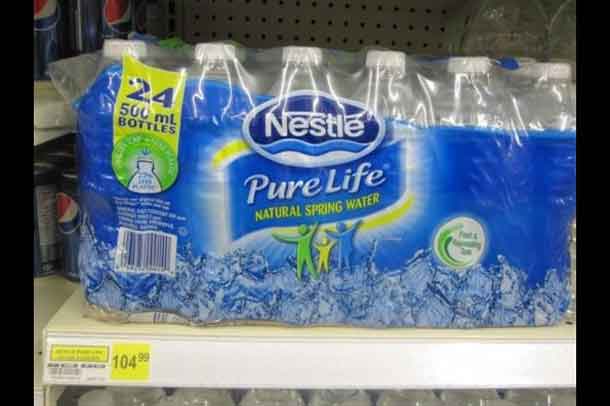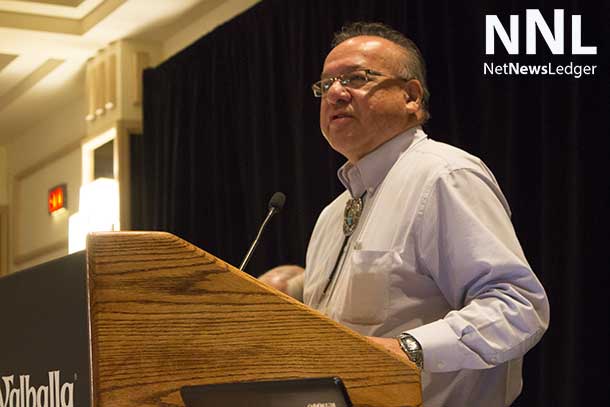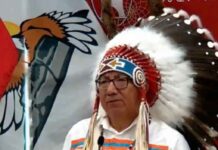
THUNDER BAY – NEWS – Nishnawbe Aski Nation (NAN) Grand Chief Harvey Yesno is challenging the Government of Canada’s commitment to meeting the infrastructure needs of First Nations despite claims made by Indian and Northern Affairs Minister Bernard Valcourt in the House of Commons yesterday.
In Parliament, NDP MP Carol Hughes asked “The Shoal Lake aboriginal community was forced to declare a state of emergency because the ferry that connects it to the shore, the only way in and out of the reserve, is in such poor condition that it failed the Transport Canada inspection.
“The community, which has been under a boil water advisory for 17 years, has been asking for a long-term solution for years.
“Will the minister intervene immediately so that the community can lift the state of emergency?”
Minister Valcourt responded, “Our immediate priority is to ensure the health and safety of Shoal Lake residents. That is why our emergency management team is in constant contact with the community. We will continue to offer help if the community needs it. To date, we have received no requests for help. However, we are also working with the aboriginal community and Health Canada to ensure that residents have access to medical services. We stand ready to provide any help required”.
“Our government continues to take action so that first nations across Canada have the same quality of drinking water as all Canadians. That is why since 2006, approximately $3 billion have been invested in first nations’ water and waste water infrastructure and related public health activities. We have made targeted investments in more than 130 major projects and have funded the maintenance of over 1,200 water and waste water treatment projects, and we will continue in that vein.”
NAN states, “When pressured by the Opposition over his government’s failure to assist with the a state of emergency in Shoal Lake No. 40 First Nation, which is cut off from the mainland without ferry service and has spent the last 17 years on a boil water advisory, the Minister made vague references to Canada-wide funding commitments his government has repeated for years instead of making a firm commitment to fixing the water and infrastructure needs of Shoal Lake and many First Nations.”

“The dire situation in Shoal Lake is very much like that across much of NAN territory, where many First Nations have been on drinking water advisories for more than 10 years and nearly all communities are in need of new or upgraded water and wastewater systems and other critical infrastructure like housing, police, firefighting, health care and education facilities,” said Grand Chief Harvey Yesno. “It is shameful that the Minister is touting nearly decade-old funding commitments instead of making the necessary investments to improve the quality of life in our impoverished communities. If the Minister was truly committed to the health and safety of First Nations we would see more action from this government.”
According to Health Canada, as of February 28, 2015, there were 139 Drinking Water Advisories in effect in 92 First Nation communities. Thirty-five of these are in NAN First Nations with 15 affecting First Nations in the riding of Kenora MP Greg Rickford, who represents the largest number of First Nation communities in Canada.
NetNewsLedger reported on how in Marten Falls, the community had been under a boil water order since 2005. The government was paying $10,000 a week to ship in water to the community. The total added up to $2.3 million over the time of the boil water advisory.
A 2011 report by the Ontario First Nations Technical Services Corporation found that it would cost approximately $1.1 billion to meet the water and waste water needs in NAN’s 49 First Nations, by upgrading or replacing exiting facilities. Despite these needs the federal government responded by cutting technical services funding for First Nations and First Nation Councils in 2012.
A 2002 report by Health Canada indicated that the level of trihalomethanes, by-products of the chlorination process linked to cancer and serious health issues, were 59 per cent above the maximum acceptable level at the water treatment plant in Chapleau Cree First Nation. The community’s concern over long-term exposure to this health threat has been directly addressed to Minister Valcourt, but there has yet to be a commitment from the federal government to address it.
Water is a Basic Human Right
“Water is a basic human right, and for years we have warned of a looming threat to the health and safety of our First Nations due to the outdated and insufficient water systems in many of our communities,” said Yesno. “And while the Minister is happy to quote numbers to appease the Opposition and the Canadian public, the sad reality in many of our communities tells a different story.”
NAN presented a cursory overview of water and wastewater systems in NAN First Nations to the Senate Standing Committee on Aboriginal Peoples in March 2011. The submission highlighted widespread concerns such as staffing and technical issues as well as illustrating common issues and service gaps. Findings included:
- Nearly all 49 NAN communities have been subject to a boil water advisory in the past five
- Nearly every community’s water plant system is in need of replacement or
- Nearly all communities face a lack of funding for the hiring and training of
- qualified staff and the safe operation of water




